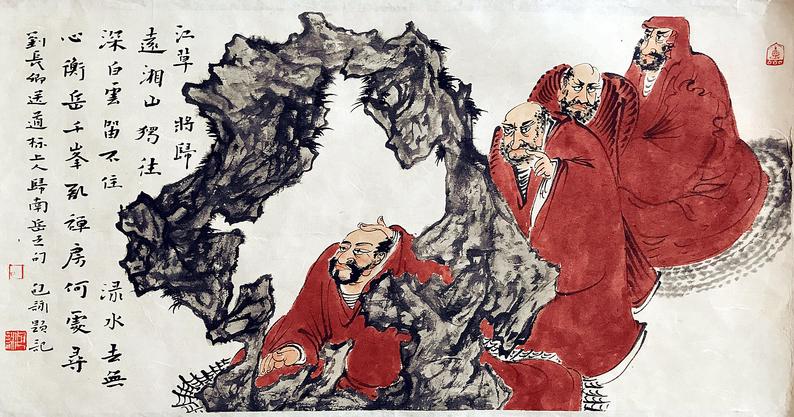
“Tao never does but through it all things are done”

Tao means “way “ in chinese. In Tao Te Ching by Lao Tzu ,which is an ancient wisdom book of chinese people dated back to 6th. century., there is a different dimensional approach to the world around us. It is too different from our dialectic way of thinking which results in the action-reaction spiral that drives us to friction,clash with our sphere squandering our energies,devoured by the conditions,which means a total exhaustion in the end. Lets revise our management mentality by the inspirations of Lao Tzu :The sage relies on actionless activity, carries on wordless teaching ( Chapter 2)
- Do not reaction , do not set rules by words, first design the affairs to prepare things for written rules
He controls myriad things but does not lean upon them. (Chapter 2)
- Aware of the things around you , but do not condition yourself with them
Whereas the force of words is soon spent. Far better is to keep what is in the heart. (Chapter 5)
- Use words to hide what is in your heart.
Therefore the sage puts himself in the background ;but is always to the fore.Remains outside; but is always there.
- Be the spirit of your organisation, not the body.Because body obeys spirit.
Is it not just because he does not strive for any personal end ,that all his personal ends are fullfilled ? (Chapter 7)
- Do not pursue your egoistic goals, but elevate the things around you so that you will be elevated with them
When your work is done then withdraw. (Chapter 9)
- Let your actions and their results speak instead of your mouth !
Be chief among them but do not manage them (Chapter 10)
- Do not order your subordinates, let the air you created in your organisation say them what to do indirectly.
He who has room in him for everything is without prejudice.To be without prejudice is to be kingly. To be kingly is to be heaven. (Chapter 16)
- Be ready for every possibility and when in action, try to see every possibility equally.
He does not show himself therefore he is seen everywhere (Chapter 22)
- Do not manage by your image, but by your principles. Create another self made by your ideals and principles your subordinates follow in case of your absence.
As the heavy must be the foundation of the light, so quitness is lord and master of activity. If he is active,the lord and the master is lost. (Chapter 26)
- Do not do , but let the things be done through you. Otherwise, there is no manager.
Perfect activity leaves no track behind it. (Chapter 27)
- What you do in somewhere should not create a problem in somewhere else.
The greatest Carver does the least cutting ( Chapter 28)
- Do the complicate with the utmost simplicity and more with the least resources.
The man of highest power does not reveal himself as a possessor of power ,therefore he keeps his power. (Chapter 38)
- Do not parade your power.
The great form is without shape. (Chapter 41)
- Do not create antagonistic structures, but create all pervading organisations.
Show me a man of violence that came to a good end and I will take him my teacher. (Chapter 42)
- Violence comes from weakness and creates its own opponent legitimising it.
The sage has not heart of his own,he uses the heart of the people as his heart. (Chapter 49)
- Try to read the hearts of your subordinates. Do not try to be understood, but first understand !
Many easies means many hard. ( Chapter 63)
- Preferring the easiest will breed the hardest in the future. So do what it must be done right now.
The greatest conqueror wins without joining the issue,
- Not by challenge but by the course of the things you will design you can conquer your rivals without fight !
The best user of men acts as though he were their inferior. (Chapter 68)
- Imply to the people, let them say what you mean and let them do what you intend to do.
The sage knows himself but does not show himself.Knows his own value,but does not put himself on high. Truly,he rejects that but takes this. ( Chapter 72)
- Do not strive for your fame. This is foolish. Let the course of things you elaborated on bring you what you need.
For it is the way of heaven not to strive but none the less to conquer. (Chapter 73)
- Do not individualy do, but let the things be done by your subtility. Make a river bed first , then watch the water flowing from there.
Truly,the hard and mighty are cast down;the soft and the weak set on high. (Chapter 76)
- Do not be rigid ,solid and big. You can be broken,shattered and targeted !
For heaven’s way is to sharpen without cutting,And the sage’s way is to act without striving. (Chapter 81)
- Sometimes let the things go, if they go in a wrong direction. If you try to hinder, they can bring you down. So let them fall. Sometimes letting is a greatest doing.
Referred to Tao Te Ching, Translated by Arthur Waley ,Wordsworth Classics,1997,Chatham